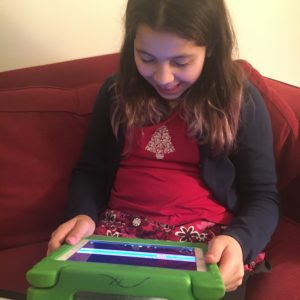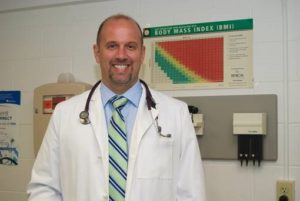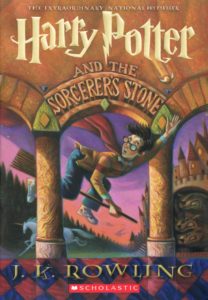Special thanks to Dr. P. Travis Harker and his daughter, Paloma, for sharing their story.
“I Won’t Read Again!”
In fourth grade, Paloma Harker declared to her parents, “I am done with reading. You can’t make me do it!” Since her earliest days in school, Paloma had trouble

decoding and comprehending printed words. She loved stories and listened attentively as her father read to her, but reading on her own was difficult. By third grade, she knew that she did not read at the same level as her classmates. Each time she tried, she experienced frustration. By age nine, she was ready to quit reading for good.
Hearing this declaration saddened her father, Travis. Why was his daughter having so much trouble reading? As a family doctor in New Hampshire, he wanted a remedy, but did not have one. “I kept asking Paloma to try harder, but that wasn’t the solution,” he said.
Dr. Harker’s medical training did not include methods for diagnosing a reading disability. He and his wife worked closely with Paloma’s teachers to address her reading challenges. Paloma tried everything — working with a tutor, receiving extra time on tasks, performing repetitive word drills – but nothing helped. Travis took her to the Developmental Medicine Center at Boston Children’s Hospital. That visit led to a discovery: Paloma had a learning disability called dyslexia. Even though she was very bright, her brain processed information differently. With a clear diagnosis, Dr. Harker looked for resources to help her.
Accessible Ebooks Were a Breakthrough
“I found Bookshare, the online library of accessible ebooks that is free for U.S. schools and students with dyslexia and other qualifying print disabilities,” he said. Those include blindness, low vision, a physical disability, or learning disabilities.
Paloma signed up for a free individual membership so she could download books. She now reads books on her iPad with an app called Voice Dream Reader that allows her to listen to text-to-speech narration while following the highlighted text. Her father noticed an immediate improvement. Bookshare plus specialized instruction was the breakthrough Paloma needed to welcome reading back into her daily life.
Signs of Reading Disabilities

After observing his daughter’s success with accessible ebooks, Dr. Harker wanted to learn more about the research on dyslexia. He recalls one study suggesting that seventy percent of children with dyslexia are incorrectly labeled with low intelligence and Attention Deficit Disorder or Attention Deficit Hyperactivity Disorder simply because they have difficulty reading.
“When it comes to learning and attention issues, working smarter is often better than working harder,” he said. “If I had known this, Paloma’s early years would have been more enjoyable and our relationship less strained.”
Now, Dr. Harker knows that the signs of a reading disability can often be mislabeled as bad behavior or low intelligence. Additionally, some children may try to disguise their reading difficulty and keep it hidden. He said, “We all need a better understanding of dyslexia. This begins with specific observations.”
In his practice, Dr. Harker encourages patients, teachers, and parents to dive deeper into a child’s behavior and reading challenges before drawing conclusions. “I  ask parents to be very specific when describing their child’s struggles,” he says. “This will help us to pinpoint a diagnosis and determine applicable accommodations, like accessible ebooks. Thankfully, our daughter is now being taught in a way that works best for her learning style and using Bookshare has helped.” Paloma attends the Carroll School in Lincoln, Massachusetts, that specializes in teaching students with dyslexia. She reads independently and is confident and happy. She even likes to read for fun.
ask parents to be very specific when describing their child’s struggles,” he says. “This will help us to pinpoint a diagnosis and determine applicable accommodations, like accessible ebooks. Thankfully, our daughter is now being taught in a way that works best for her learning style and using Bookshare has helped.” Paloma attends the Carroll School in Lincoln, Massachusetts, that specializes in teaching students with dyslexia. She reads independently and is confident and happy. She even likes to read for fun.
How Can You Advocate for More Education About Dyslexia and Accessible Ebooks in Schools?
Dr. Harker recently joined Bookshare advocates at his New Hampshire U.S. Senator’s office. They discussed the need for more education about dyslexia and for more access to ebooks in schools. “I am lending my support for continued federal funding for Bookshare,” he says. “I am grateful for the resource and want to be a better champion for children with reading challenges. Every child deserves to be recognized for their true learning potential, and with the right solutions they can enjoy a bright future ahead, just as my daughter now has.”
Travis Harker, M.D., serves as the Chief Medical Officer for Granite Health. A faculty member of the New Hampshire Dartmouth Family Medicine and Leadership Preventive Medicine Residency programs, he was named Family Physician of the Year in 2014 by the New Hampshire Academy of Family Physicians. He also writes an “Expert Corner” blog about learning and attention issues for Understood.

What a great story of success for children who have a learning disability!
Thank you for sharing! I am a special ed teacher and this will be helpful for my students!
What a great story! I just signed up for BookShare and cannot wait to get started reading even more books. I have been registered with NLS since the mid-80’s, and when I found out that they are a BookShare partner I jumped at the chance.